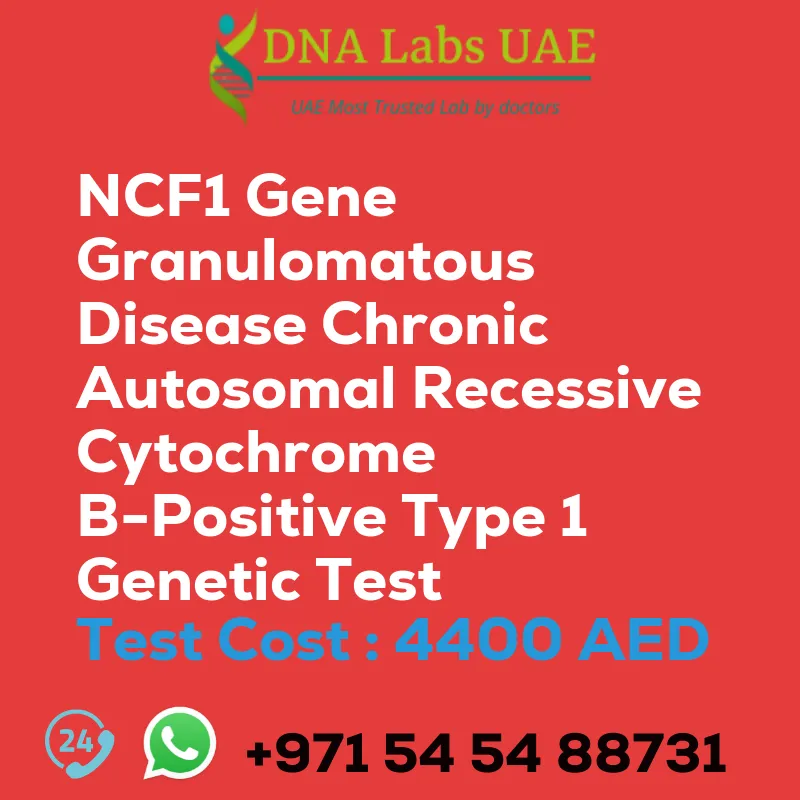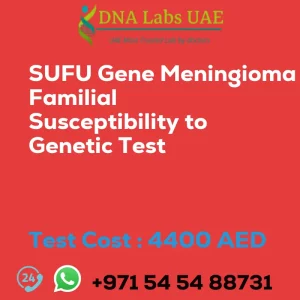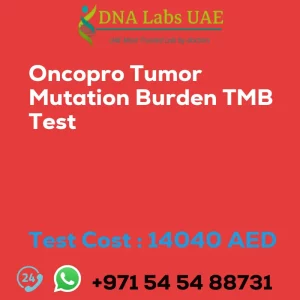NCF1 Gene Granulomatous Disease Chronic Autosomal Recessive Cytochrome b- Positive Type 1 Genetic Test
Test Details
The NCF1 gene is associated with a condition called chronic granulomatous disease (CGD), which is an inherited immune system disorder. CGD is characterized by recurrent bacterial and fungal infections due to the inability of certain white blood cells to effectively kill invading microorganisms. The NCF1 gene provides instructions for producing a protein called neutrophil cytosolic factor 1 (NCF1), which is a subunit of the NADPH oxidase enzyme complex. This complex plays a crucial role in the immune system by generating reactive oxygen species (ROS) that are necessary for the destruction of bacteria and fungi.
Mutations in the NCF1 gene can result in a non-functional or reduced-functioning NCF1 protein, leading to impaired ROS production and increased susceptibility to infections. CGD caused by mutations in the NCF1 gene is inherited in an autosomal recessive manner, meaning that both copies of the gene must be affected for the disease to manifest.
Test Components
- Price: 4400.0 AED
- Sample Condition: Blood or Extracted DNA or One drop Blood on FTA Card
- Report Delivery: 3 to 4 Weeks
- Method: NGS Technology
- Test Type: Cancer
- Doctor: Oncologist
- Test Department: Genetics
Pre Test Information
Clinical History of Patient who is going for NCF1 Gene Granulomatous disease, chronic, autosomal recessive, cytochrome b- positive, type 1 NGS Genetic DNA Test. A Genetic Counselling session to draw a pedigree chart of family members affected with NCF1 Gene Granulomatous disease, chronic, autosomal recessive, cytochrome b- positive, type 1 NGS Genetic DNA Test gene NCF1.
Test Method
The cytochrome b-positive, type 1 NGS genetic test is a next-generation sequencing (NGS) test that can identify mutations in the NCF1 gene. This test analyzes the individual’s DNA to detect any changes or variations in the gene sequence that may be responsible for the development of CGD. By identifying mutations in the NCF1 gene, this genetic test can help confirm a diagnosis of CGD and provide information about the specific genetic cause of the disease.
Importance of the Test
This information is important for understanding the inheritance pattern, predicting the risk of CGD in family members, and guiding appropriate management and treatment strategies.
| Test Name | NCF1 Gene Granulomatous disease chronic autosomal recessive cytochrome b- positive type 1 Genetic Test |
|---|---|
| Components | |
| Price | 4400.0 AED |
| Sample Condition | Blood or Extracted DNA or One drop Blood on FTA Card |
| Report Delivery | 3 to 4 Weeks |
| Method | NGS Technology |
| Test type | Cancer |
| Doctor | Oncologist |
| Test Department: | Genetics |
| Pre Test Information | Clinical History of Patient who is going for NCF1 Gene Granulomatous disease, chronic, autosomal recessive, cytochrome b- positive, type 1 NGS Genetic DNA Test. A Genetic Counselling session to draw a pedigree chart of family members affected with NCF1 Gene Granulomatous disease, chronic, autosomal recessive, cytochrome b- positive, type 1 NGS Genetic DNA Test gene NCF1 |
| Test Details |
The NCF1 gene is associated with a condition called chronic granulomatous disease (CGD), which is an inherited immune system disorder. CGD is characterized by recurrent bacterial and fungal infections due to the inability of certain white blood cells to effectively kill invading microorganisms. The NCF1 gene provides instructions for producing a protein called neutrophil cytosolic factor 1 (NCF1), which is a subunit of the NADPH oxidase enzyme complex. This complex plays a crucial role in the immune system by generating reactive oxygen species (ROS) that are necessary for the destruction of bacteria and fungi. Mutations in the NCF1 gene can result in a non-functional or reduced-functioning NCF1 protein, leading to impaired ROS production and increased susceptibility to infections. CGD caused by mutations in the NCF1 gene is inherited in an autosomal recessive manner, meaning that both copies of the gene must be affected for the disease to manifest. The cytochrome b-positive, type 1 NGS genetic test is a next-generation sequencing (NGS) test that can identify mutations in the NCF1 gene. This test analyzes the individual’s DNA to detect any changes or variations in the gene sequence that may be responsible for the development of CGD. By identifying mutations in the NCF1 gene, this genetic test can help confirm a diagnosis of CGD and provide information about the specific genetic cause of the disease. This information is important for understanding the inheritance pattern, predicting the risk of CGD in family members, and guiding appropriate management and treatment strategies. |








